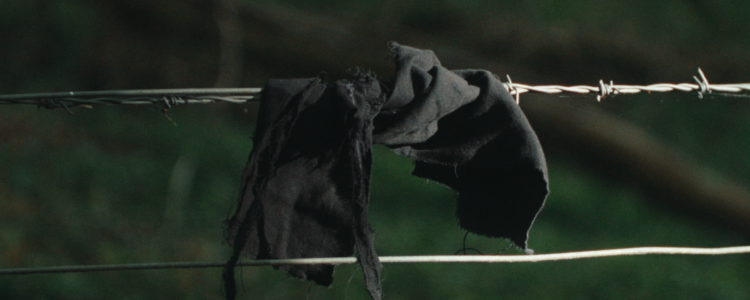Free to Forage: Right of Way Tour
Right of Way is a new feature-length programme that mixes stunning new artists’ commissions with historical archive films that give a bigger picture of questions of access and inclusion in the UK countryside. This programme is presented by the ICO and LUX and supported by the BFI Film Audience Network and Arts Council England. Bookings are available through to September 2023.
We are touring Right Of Way as part of Free to Forage. For more information and screening dates check out our dedicated page here.
The new commissions interrupt and challenge the enduring perception of the rural idyll as an untouched and unchanging space where time stands still. What happens when Black, Asian and other ethnically diverse people enter these landscapes? How can our natural spaces be homes to protest, trespassing, activism and raves? Paired with archive films that show that the life of the countryside contains multitudes and disrupt simple narratives, this programme is a terrific platform for debate on historical and contemporary discussions about who has a right to the great outdoors and who is excluded from it.
FILMS
Eastbourne - Director: Gilbert Tomes , 1958
Holidaying in Eastbourne, the Sanderstead Youth Fellowship take in an organised walk over the South Downs from Beachy Head to Cuckmere Haven. Courtesy of Screen Archive South East at the University of Brighton
Pilgrim’s Way - Director: William N. Boyle - 1956
From Farnham to Canterbury, this 120-mile trek across the famous Pilgrim’s Way section of the North Downs Way takes in some of south-east England’s prettiest towns, villages and pastures. Courtesy of BFI National Film & Television Archive
Father Thames - Unknown - 1935
Recorded over 60 years prior to the establishment of the Thames Path National Trail, this film follows England’s best-known river for 185 miles as it ambles from its source in the Cotswolds through several rural counties and into the heart of London. Courtesy of BFI National Film & Television Archive
Holiday on the North Norfolk Coast - Director: Unknown - 1952
Glasgow’s Countryside Club visits the North Norfolk Coast, taking in sights along the still-to-be-established National Trail Path. In this clip the group journeys from Morston Quay to explore Blakeney National Nature Reserve. Courtesy of the East Anglian Film Archive at the University of East Anglia
South Downs Way - Director: Unknown - 1975
This amateur travelogue-style documentary follows the route of the South Downs Way three years after its official opening, accompanied by a voiceover providing historical narrative on the route and local history of the areas it passes through. Courtesy of Screen Archive South East at the University of Brighton
Norfolk, 1986 - Director: Unknown - 1986
One week before Prince Charles opens the Peddars Way Long Distance Path, local journalist Bruce Robinson talks through the book he has written about the historic Roman road it follows. Courtesy of the East Anglian Film Archive at the University of East Anglia
Country Ways: The Ridgeway in October - Director: Paul Slater - 1988
ITV’s popular Country Ways television series explores The Ridgeway National Trail through the eyes of the people that live and work along the historic pathway, commonly known as ‘Britain’s oldest road’. Courtesy of the Wessex Film and Sound Archive at Hampshire County Council
black strangers - Director: Dan Guthrie
After seeing a mention of a man called ‘Daniel’ on a Bishop’s Transcript held in Gloucestershire Archives, Dan goes for a walk in the woods in search of the man buried in Nympsfield in 1719 and described on the Transcript as ‘a black stranger’. Whilst walking, Dan talks directly to Daniel, speculating about the parallels between him and his namesake, and about how he’s been made to feel like a ‘black stranger’ in his hometown of Stroud.
Pastoral Malaise - Director: Ufuoma Essi
Pastoral Malaise is a short film about the absences within rural pastoral environments, often framed by romanticism and picturesque conventions, constructed as tourist sites and refuges in rural landscapes across Britain.
Syncopated Green - Director: Arjuna Neuman
Syncopated Green reflects on the history of outdoor free parties in the English countryside, using rave music, past and present, to help forget the ‘official’ portrayal of England as picturesque, nostalgic, white, and rural. The film invites rave music into the English landscape – turning imperial history inside out. Somewhere between a music video, a memoir and an essay, it asks: how might our future be different if we had other histories to lean on – and dance with?
Certificate: 12A
Running times: Archive Films 51 minutes, New Commissions 34 minutes. Total running time: 85 minutes
Please note: Black Strangers and Syncopated Green contain sequences with flashing lights, which may be unsuitable for viewers with photosensitive epilepsy.





